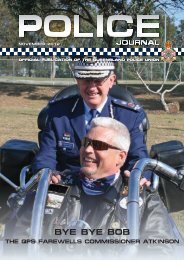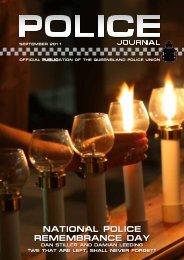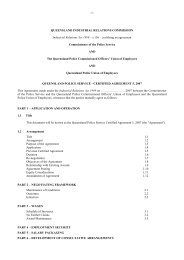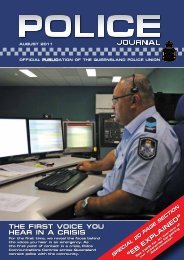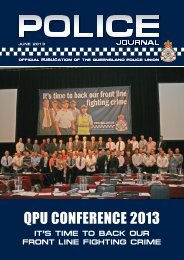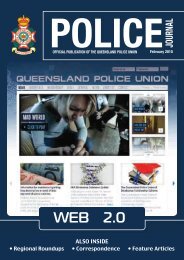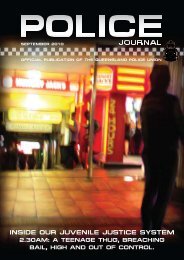Ph 3259 1900 (24 hours) - Queensland Police Union
Ph 3259 1900 (24 hours) - Queensland Police Union
Ph 3259 1900 (24 hours) - Queensland Police Union
You also want an ePaper? Increase the reach of your titles
YUMPU automatically turns print PDFs into web optimized ePapers that Google loves.
Southern Region Roundup<br />
DARREN LEES<br />
FATIGUE MANAGEMENT – WHOSE RESPONSIBILITY IS IT?<br />
A recent article in the Sunday Mail related to the amount of money the QPS earned in specials payments over<br />
the last year. The amount quoted in the story was $30,790,000 over the 2011/2012 year: some serious coin in<br />
anyone’s terms. Of course, our members benefit from it, and in some cases, our members need to perform these<br />
specials to make ends meet in an economic environment where everything seems to rise well in excess of any<br />
pay increases we receive.<br />
While the financial information<br />
pertaining to specials duties in the<br />
article is an interesting read, it got<br />
me thinking of something that is very<br />
topical at the moment: the issue of<br />
fatigue management.<br />
The QPS seems to have taken a very<br />
serious line towards it as part of their<br />
WH&S management, and it is topical<br />
“The general principle<br />
is simple: fatigue<br />
management is the<br />
responsibility of every<br />
single person within<br />
an organisation.”<br />
particularly as I write this article,<br />
because I am due to start work at<br />
10pm tonight for my sixth night<br />
wireless.<br />
Only a few months ago, our QPU<br />
Executive attended a presentation<br />
by Peter Simpson, a gentleman<br />
from Western Australia who is<br />
recognised as a bit of a guru on the<br />
issue of fatigue management and its<br />
impact on workers in a wide range<br />
of industries, particularly the mining<br />
industry.<br />
The QPS has commissioned Peter to<br />
conduct research into the issue of<br />
fatigue management and to assist<br />
with information sharing between<br />
management and supervisors<br />
throughout the state<br />
When we heard Peter speak, the<br />
Manager of the QPS Wellbeing<br />
section, Colin Anderson, was also<br />
present. A lot of what Peter and Colin<br />
said made perfect sense to me.<br />
The general principle I took away<br />
from the presentation is simple:<br />
fatigue management is the<br />
responsibility of every single person<br />
within an organisation.<br />
It is the responsibility of the<br />
employee coming to work to ensure<br />
they are not fatigued to the point<br />
that they place themselves and their<br />
workmates at risk.<br />
It is the responsibility of the QPS<br />
Senior Executive to ensure they<br />
have suitable and effective fatigue<br />
management policies designed to<br />
assist our members in the workplace,<br />
ensure they have appropriate risk<br />
management strategies to address<br />
the issue of members who sometimes<br />
necessarily come to work fatigued.<br />
Much of what the Service speaks<br />
about pertaining to fatigue<br />
management is often linked to special<br />
duties, and our members performing<br />
those duties on rest days or before or<br />
after shifts.<br />
In the eyes of many, this practice<br />
may be causing our members to be<br />
significantly fatigued, and hence<br />
they may be placing themselves and<br />
others at risk when they are actually<br />
at work performing their rostered<br />
shifts.<br />
I understand that, and have no issue<br />
with the aspect of special duties being<br />
one area where our members need to<br />
be careful that they are not smashing<br />
themselves to a point where they can<br />
only ever be fatigued at work.<br />
“It is a well-known fact that when there is a<br />
major investigation occurring, detectives may<br />
go days with very little (if any) sleep, until the<br />
baddie is in the bin.”<br />
and to ensure the risk of someone<br />
making a life or death decision while<br />
fatigued is minimised.<br />
It is the responsibility of the NCOs<br />
and managers of stations, sections,<br />
and teams within our Service to<br />
However, this is not the only area<br />
where our members will experience<br />
fatigue at work, and the QPS needs to<br />
take a long, hard look at its policies to<br />
protect all our members and ensure<br />
we do not have people at work who<br />
are so fatigued they cannot function.<br />
<strong>Queensland</strong> <strong>Police</strong> <strong>Union</strong> Journal August 2012 9




